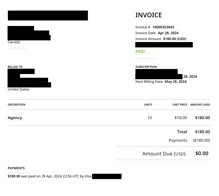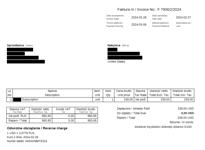In the realm of financial management, proof of payment is a critical component that ensures transparency, compliance and efficiency. For finance teams and procurement managers, understanding and managing proof of payment is essential for accurate record-keeping, auditing and reimbursement processes.
What Constitutes Valid Proof of Payment?
Proof of payment refers to any document or record that verifies a payment has been made. Common examples include:
- Receipts detailing the transaction
- Bank or credit card statements showing the payment
- Canceled checks
- Paid invoices marked accordingly
- Wire transfer confirmations
These documents are vital for substantiating expenses during audits and ensuring compliance with financial regulations.
Examples of Proof of Payment Receipt


The document must include:
- Date
- Currency
- Amount paid
- Description of services provided
- Payment method
Importance of Proof of Payment in Expense Management
- Audit Compliance
Maintaining accurate proof of payment is crucial for passing internal and external audits.
- Fraud Prevention
Proper documentation helps detect and prevent fraudulent activities within the organization.
- Efficient Reimbursements
Clear proof of payment ensures timely and accurate employee reimbursements.
- Financial Transparency
Detailed records contribute to transparent financial reporting and budgeting.
For more insights on preventing expense report fraud, read our article: Common Types of Expense Report Fraud And How to Prevent Them
Challenges in Managing Proof of Payment
Traditional methods of managing proof of payment, such as manual record-keeping, can lead to:
- Lost or misplaced receipts
- Delayed reimbursements
- Increased risk of errors
- Non-compliance with audit requirements
To understand how to select the right expense management software to mitigate these challenges, refer to our guide: Choosing Wisely: Selecting the Right Expense Management Reporting Software for Your Business
How ExpensePoint Simplifies Proof of Payment Management
ExpensePoint offers a comprehensive solution to streamline the management of proof of payment:
- Digital Receipt Capture
Employees can easily upload receipts via mobile or desktop, reducing the risk of lost documents.
- Automated Matching
The system automatically matches receipts with corresponding expenses, ensuring accuracy.
- Real-Time Reporting
Finance teams have access to up-to-date reports, facilitating better decision-making.
- Compliance Assurance
Built-in checks ensure all necessary documentation is present for each expense, aiding in audit readiness.
Best Practices for Managing Proof of Payment
- Implement a Centralized System
Utilize platforms like ExpensePoint to centralize expense reporting and documentation.
- Educate Employees
Train staff on the importance of submitting accurate and timely proof of payment.
- Regular Audits
Conduct periodic reviews to ensure compliance and identify areas for improvement.
- Use AI & Automation
Let intelligent tools handle the heavy lifting—from receipt capture to anomaly detection—freeing up your finance team’s time.
For a deeper understanding of how to manage per diem and its tax implications, read: How Per Diem Factors into Your Tax Return
Turn Paper Chaos into Digital Confidence
Legal proof of payment isn't just about record-keeping—it’s the foundation of trust, compliance, and operational efficiency. With ExpensePoint, your team gains the visibility, control, and automation needed to thrive in today’s complex financial landscape.
Whether you're looking to eliminate undetected expense fraud or trying to improve audit reporting confidence, ExpensePoint is your all-in-one solution.
Start simplifying your expense management today. Book a demo with ExpensePoint.